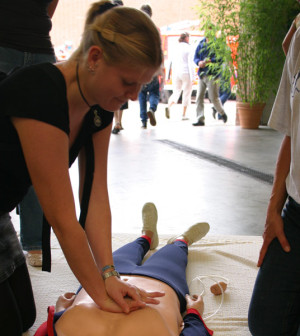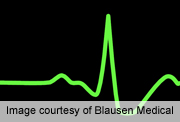- Could Your Grocery Store Meat Be Causing Recurring UTIs?
- Are You Making This Expensive Thermostat Error This Winter?
- Recognizing the Signs of Hypothyroidism
- 10 Strategies to Overcome Insomnia
- Could Artificial Sweeteners Be Aging the Brain Faster?
- Techniques for Soothing Your Nervous System
- Does the Water in Your House Smell Funny? Here’s Why
- Can a Daily Dose of Apple Cider Vinegar Actually Aid Weight Loss?
- 6 Health Beverages That Can Actually Spike Your Blood Sugar
- Treatment Options for Social Anxiety Disorder
Wireless ECG Speeds Up Heart Attack Treatments, Study Shows


A new wireless electrocardiogram (ECG) can cut the time it takes for heart attack patients to receive treatment, new research suggests.
A study from Doha, Qatar, examined outcomes among 510 heart attack patients, and found a trans-satellite wireless 12-lead ECG cut the ambulance-to-angioplasty time by more than half an hour compared to standard treatments.
The research, by Dr. Abdurrazzak Gehani, chief cardiologist at the Heart Hospital in Doha, and colleagues was to be presented Tuesday at the American Heart Association meeting in Chicago. The data and conclusions of research presented at medical meetings should be viewed as preliminary until published in a peer-reviewed journal.
Ambulance crews used the ECG to take a patient’s heart readings, which were immediately transmitted via satellite to the hospital so that cardiologists could determine the best treatment method while the patient was on the way.
In the study, 55 percent of the patients got wireless ECG and were sent directly to the Heart Hospital in Doha, while 45 percent did not get the wireless ECG and were sent to other hospitals first before arriving at the Heart Hospital.
The time between arrival at the Heart Hospital and the start of heart artery-opening angioplasty was about 53 minutes for patients in the wireless ECG group and about 104 minutes for those in the other group, the study showed.
The delay from the start of heart attack symptoms to the start of angioplasty was 36 minutes less for patients in the wireless ECG group than for the other group. They also had a lower risk of death while in hospital (2.5 percent versus 3.5 percent) and shorter hospital stays (3.4 days versus 4.3 days), the findings showed.
More information
The U.S. National Heart, Lung, and Blood Institute has more on heart attack treatment.
Source: HealthDay
Copyright © 2026 HealthDay. All rights reserved.










